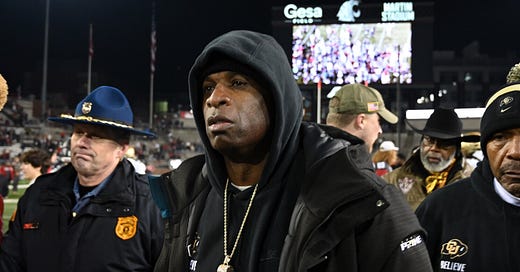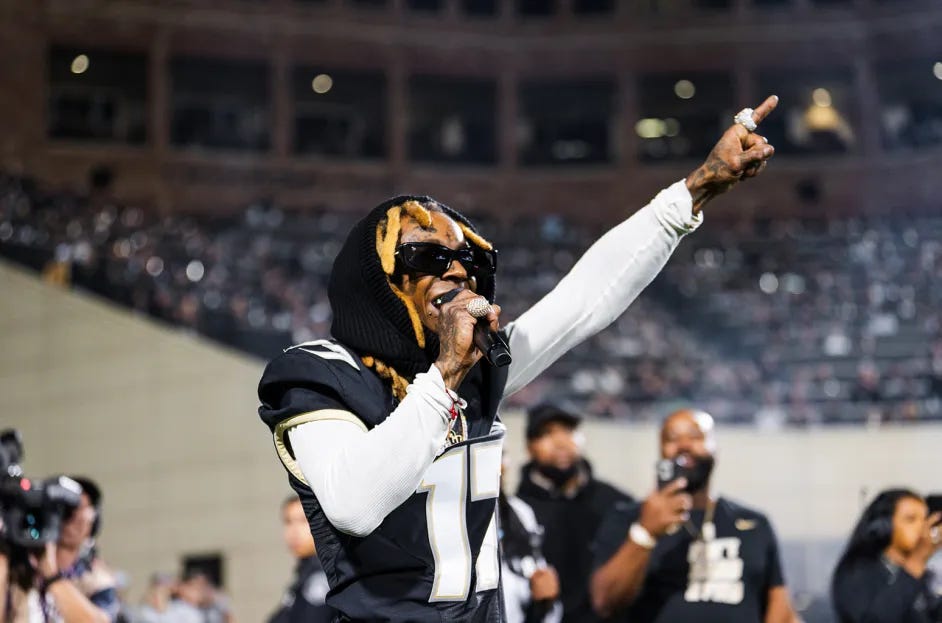How Deion Sanders' first Colorado team created its own special hell
The Buffs were much improved from what they were when Coach Prime took over, but they became the worst team in college football history that got every opponent's best shot
About an hour after Deion Sanders was unveiled as Colorado’s new football coach last December at an introductory press conference that may as well have been a pep rally, a black Tesla turned right onto Stadium Drive, just south of the Buffs’ stadium, Folsom Field.
As he came upon a man walking down the sidewalk, the driver came to a stop and rolled down his window.
Blasting from his car’s speakers was “Prime Time Keeps on Tickin,” a single from Sanders’ 1994 album called – what else? – “Prime Time.” While the song played, the driver stuck his head out the window and looked at the stranger on the sidewalk.
“That’s our new coach on the radio!” he shouted.
Almost a full year later, it’s a scene I still think about whenever it comes to Colorado. That afternoon, I was one of the hundreds of people gathered around Sanders as he preached to his new congregation, but nothing he uttered over that time summed up his hiring quite as effectively as that three-second exchange I witnessed on my walk back to my car.
The man behind the wheel of the Tesla wasn’t excited because Colorado was good. A week earlier, the Buffs wrapped up one of the worst seasons in program history with a 1-11 record and nobody, not even the person who might be the most magnetic and charming figure in the history of American team sports, could fix that overnight. But by simply hiring Sanders, and before he had even run a practice, Colorado mattered in a way it hadn’t in 30 years.
Throughout Sanders’ first season, it was a designation that was both a blessing and a curse.
Sanders both upgraded the Buffs’ roster and made it so that Colorado would face even more obstacles than it did the previous year, when it was at a significant talent disadvantage virtually every time it took the field.
Through factors within his control, Sanders thrust Colorado into a thorny, entirely unenviable predicament that had never been seen before in quite the same way in the history of college football: it was a below-average team that got the best, most hyper-focused shot from virtually every opponent it played.
Among other reasons, it’s how a 3-0 team that rose as high as No. 19 in the national polls finished the season 4-8, losing eight of its final nine games (with the lone victory coming by three points on a last-second field goal).
The predictable final result, though, belied a fascinating, instructive and occasionally maddening journey.
Under most any realistic scenario, Sanders’ first team was going to struggle. He controversially overhauled the Buffs’ roster, bringing in 87 new players, 57 of whom came in from the transfer portal, but for all that tinkering, the team’s offensive and defensive lines didn’t appear to be much better than they were the year before. They were a phenomenal seven-on-seven team tasked with playing an 11-on-11 game, making them a Ferrari with a lawnmower’s engine under the hood.
Expectations adjusted around that reality. Colorado was picked to finish 11th in the Pac-12 and had a preseason over/under of 3.5 wins.
Then, something funny happened – they won.
They shocked defending national runner-up TCU on the road as a three-touchdown underdog. They throttled rival Nebraska. Even when they needed a late rally to beat Colorado State, a rebuilding Mountain West program, they were still 3-0.
A roster that ESPN’s Tom Luginbill said might be the worst in college football was turning heads and negating doubts. Instead of recognizing that early, perhaps unsustainable success, too many did what they too often do in such a situation – they overreacted.
Outlets breathlessly commented on how Sanders was a trendsetter radically reshaping college football, with one outlet proclaiming that he was “transforming a once-staid sport” (say what you will about college football, but it ain’t staid). The staff of the Dan Le Batard Show put up a dry erase board tallying the number of days they had gone without talking about Sanders because the program’s eponymous host discussed him so frequently, often repeating the same lines about how he was changing the sport. Even before the season began, and in one of the more ridiculous takes you’ll ever stumble upon, the mummified corpse of Deadspin suggested that Pac-12 media day shut down because Sanders wouldn’t be there – ignoring the fact that the league was poised to be the best, deepest and most talented in the sport in 2023. In an otherwise well-reported piece, ESPN’s Andscape dubbed Colorado – a school where Black students account for 2.7% of the undergraduate enrollment – as “Black America’s team.”
It didn’t end there. Fox’s “Big Noon Kickoff” pregame show was on site at each of Colorado’s first three games. By the third of those games, the aforementioned win against Colorado State, ESPN’s “College GameDay” descended upon Boulder, as well. Despite being a 500-1 longshot in late August, the Buffs had attracted more national championship bets at BetMGM sportsbooks than four teams ranked in the top 10. Celebrities like The Rock, Lil Wayne, Offset, Key Glock, LeBron James and Jay-Z were showing up on the sidelines or, in Weezy’s case, leading them out on the field.
That meteoric and occasionally eyeroll-inducing rise was met with an inevitable fall.
Keep reading with a 7-day free trial
Subscribe to The Front Porch to keep reading this post and get 7 days of free access to the full post archives.





